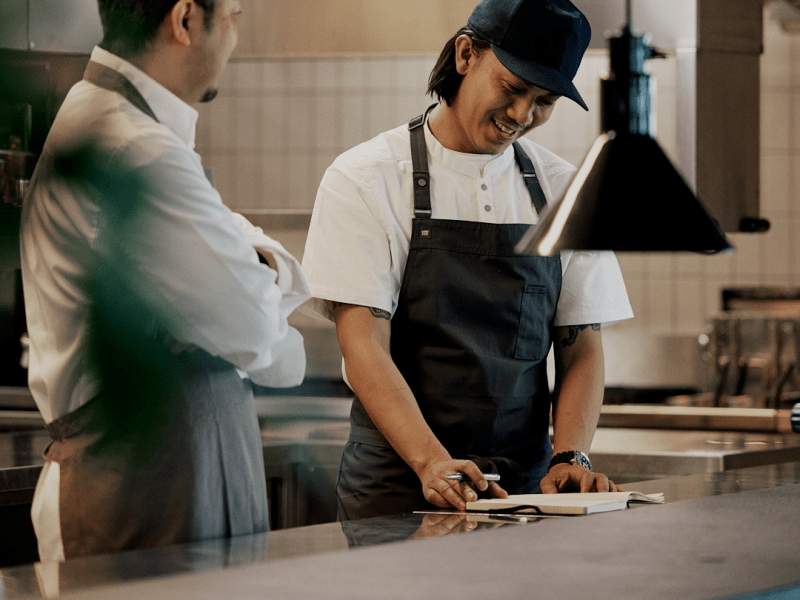10 Ways to Seas the Day: Caring for the Blue Planet This World Oceans Day and Beyond
World Oceans Day offers us a unique opportunity to unite, celebrate, and take action to safeguard the seas, which supply over half of the world’s oxygen, regulate our climate, nourish billions of people, and so much more.

In the last few years alone, World Oceans Day (WOD)—celebrated annually on June 8—has united over 140 countries, inspired 3,000+ events, and extended critical information to over one billion people worldwide. This year, the theme is “Awaken New Depths,” highlighting that we have only explored roughly 10% of our oceans, and our knowledge pales in comparison to the vastness of the blue planet. We understand the consequences of our actions as humans, yet our solutions lack the depth to truly ignite a wave of positive change for the seas. So far, our efforts have only skimmed the surface, but World Oceans Day is an opportunity to channel momentum and awaken new depths.
You can register for the UN World Oceans Day virtual event broadcast (on June 7) here to watch various environmental experts, decision-makers, executives, journalists, celebrities, and activists present the many ways in which we can all finally start to put the oceans first. From shell collections to beach meditations and ocean-inspired watercolor workshops, honor the beauty, bounty, and wonder of our aquatic ecosystems with celebrations across our sanctuaries.
To empower you to take action for the blue planet, we’ve outlined 10 tangible ways to protect our open waters daily—inspired by a guide created by our friends at Oceanic Global. We hope this list serves as a reminder that small daily actions can generate a ripple effect of positive change.
1. STRAY AWAY FROM PLASTICS.
Every minute, an estimated two garbage trucks of plastic are dumped into the ocean. By the time you’re finished reading this article, that’s 20 garbage trucks of plastic—and experts estimate that this figure will triple by 2040. To reduce your own plastic footprint, we recommend starting by doing your best to avoid unnecessary single-use plastics. Across our properties, we’ve replaced single-use plastics with items such as glass cups, bulk shower products, water filtration systems, and alternative storage containers in our kitchens.
In addition to single-use plastic items, did you know that a massive amount of ocean microplastics come from clothing? A 2020 study conducted at the University of Plymouth reveals that, in one year, a single person can release nearly 300 million synthetic microfibers to their water supply through laundry and over 900 million microfibers to the air through daily wear. To combat this, we recommend the following.
- Seek clothing made from natural materials, rather than plastic synthetics. This can help reduce the number of microplastics that enter our water sources during laundry.
- Use a washing bag during laundry. Using tools like a Guppyfriend bag or Cora Ball will further reduce the number of microplastics and synthetic fibers that enter surrounding water sources.
Another tip: Encourage your favorite companies to explore plastic-free materials. From clothing to linens and to-go containers, avoiding plastic at the corporate level can make a huge impact. You know you can count on us to seek responsible materials—from the chairs you sit on to the cups we drink from.
2. REDUCE YOUR CARBON FOOTPRINT.
The best way to get started is to review our previous article, “Want to stop wondering if your individual choices matter for the climate?”
It outlines action items, ranging from adopting a healthy mindset around your carbon footprint and its impact to identifying areas that will allow you to make the biggest impact.
Our partners at Oceanic Global also recommend:
- Choosing a climate-friendly diet (find more information on the planetary impact of common foods here)
- Biking, walking, bussing, and carpooling rather than a solo drive
- Seeking renewable energy whenever possible
- Insulating your home for increased efficiency
When implementing new habits that reduce your carbon footprint, it’s important to choose ones that you feel comfortable maintaining over time.
3. SEEK RESPONSIBLE SEAFOOD.
There are a few key things to look out for when it comes to enjoying seafood responsibility. Here are a few tips that we follow when we source seafood ourselves:
- Choose local, seasonal, and well-managed seafood like oysters and other bivalves.
- Opt for smaller fish that are lower on the food chain to reduce pressure on top predators.
- Choose to eat invasive species that threaten native marine biodiversity.
Rest assured that, across our properties, we seek out sustainable, locally sourced seafood whenever possible to minimize our impact on the blue planet. At 1 Hotel Hanalei Bay, all dining venues are designated Ocean Friendly Restaurants by Surfrider Kauaʻi, an organization dedicated to ocean and marine life conservation. Ocean Friendly Restaurants prioritize cutting out single-use plastics and following a framework to make more sustainable choices for our oceans.
4. PURCHASE OCEAN-FRIENDLY PRODUCTS.
One easy way to do this is to screen your products in an online “clean product” database, such as the Environmental Working Group (EWG) Skin Deep database. There, you’ll be able to find clean products/alternatives that avoid harmful ingredients, including the ones listed below.
- Microbeads: Polyethylene or polypropylene (you can usually see them with your eye)
- Chemical sunscreen filters: Oxybenzone, octinoxate, octocrylene, homosalate, PABA, parabens, triclosan, and 4-methyl benzylidene camphor
- Siloxanes: Cyclopentasiloxane, Cyclopentasiloxane, Cyclopentasiloxane, and Cyclomethicone, which are often found in conditioners and gels
- Parabens: These are hormone disruptors that can be harmful to your own body and have been found in the tissues of marine animals like dolphins, sea otters, and polar bears
- Triclosan: A bacterial agent (found in many soaps and toothpaste) that can harm algae and the hormone levels of marine animals (and humans)
Seeking ocean-friendly products is not only better for the blue planet, but it’s also better for your own health too!
5. STAY CURIOUS.
Well, you’re here, so we know you’re already curious. If you want to learn more about the state of our oceans and what you can do to help protect them, check out Oceanic Global’s favorite resources:
Be sure to follow @1hotels and @oceanic.global on Instagram to stay up-to-date on new resources and articles related to ocean-climate connection, climate change, and more—like this one.
6. RAISE YOUR VOICE.
Let’s talk about it. Add your voice to petitions, talk about the ocean-climate connection with your community, spread the word through social media, contact your representatives (local, state, national), let them know this topic is important to you, and find out exactly what they’re doing to safeguard the planet.
For those in the US, 2024 is a very important election year—and a very pivotal point for climate change and ocean conservation. It’s important to understand each candidate’s outlook on environmental issues, including where they stand on ratifying the High Seas Treaty. This treaty is a historic step toward protecting at least 30% of ocean areas by 2030 and requires 60 countries to ratify. As of June 2024, only seven have done so.
7. SUPPORT ORGANIZATIONS THAT SHARE YOUR VALUES.
We’re an organization that embodies our values, but we also pay it forward by supporting organizations that support our values too.
From our partnerships with organizations like Oceanic Global, the NRDC, and Foodprint Group to our local architects, landscapers, designers, and purveyors, we understand that supporting each other is one of the best ways to sustain lasting positive change.
If you’re able, we encourage you to support your favorite organizations through donations, volunteering, or simply sharing their resources on social media. You can donate to and explore educational resources from some of our favorite nonprofits using the links below.
8. ENCOURAGE YOUR FAVORITE BUSINESSES TO BE OCEAN-MINDED.
Corporations and industrial enterprises have the means to drive positive action on a huge scale. That’s exactly why we’re always searching for new ways to mitigate waste, fight climate change, and safeguard the natural world.
What does that look like for us?
- True Zero Waste: Across all of our operations, we’ve developed programs designed to eliminate waste with the help of our partners at the Foodprint Group. We’re working towards our short-term goal of 70% waste diversion from landfills and incinerators, keeping in mind our long-term target of 90% or greater total waste diversion in accordance with USGBC’s TRUE Zero Waste certification. To accomplish this, we’re creatively minimizing waste from every angle—from sourcing compostable alternatives to plastic to working directly with haulers to ensure our waste does not reach a landfill.
- Certified Sustainable Gatherings: Large events are a huge culprit of waste (including harmful plastic waste), but our first-of-its-kind event planning program allows you to gather, celebrate, and connect in a way that honors the planet. Through diligent planning, committed vendors, and measurable methods proven by our partners at Foodprint Group, we’ll help you minimize single-use plastics and divert at least 90% of all waste. The result is a gorgeous event that ignites a ripple effect of positive change.
As always, we invite you to reach out to us if you have new suggestions or challenges for our brand, as we aim to serve as a platform for change in the hospitality industry and beyond.
9. JOIN THE OCEANIC GLOBAL SOLUTION.
Oceanic Global has volunteer hubs around the world—in the Hamptons, Los Angeles, New York, London, and Barcelona. These hubs are led by passionate volunteers who host events and inspire local action on a global scale.
If you live in one of these areas, we encourage you to join your local hub. Not only is it a great way to advocate for the planet, but it’s also the perfect place to meet like-minded people.
10. STAY GROUNDED IN NATURE.
As humans, we’re more passionate about protecting the things we love and feel connected to.
When you spend more time grounding yourself in nature, you’ll be reminded of why you’re so passionate about protecting the natural world. Spending time in nature has been shown to reduce anxiety and generate positive emotions like joy and calmness, and studies have shown that listening to nature sounds like waves crashing can improve cognitive performance.
Take a mindful nature walk, spend time photographing outside, or take your workout outdoors. One sure way to ground yourself and reconnect with your roots is to enjoy a sustainable stay at one of our sanctuaries. Through our biophilic designs, we bring the outside in. From our daylight-enhancing architecture to our verdant ivy walls, you’ll be reminded of the awes of the natural world at every turn—and inspired to do everything you can to protect it.












